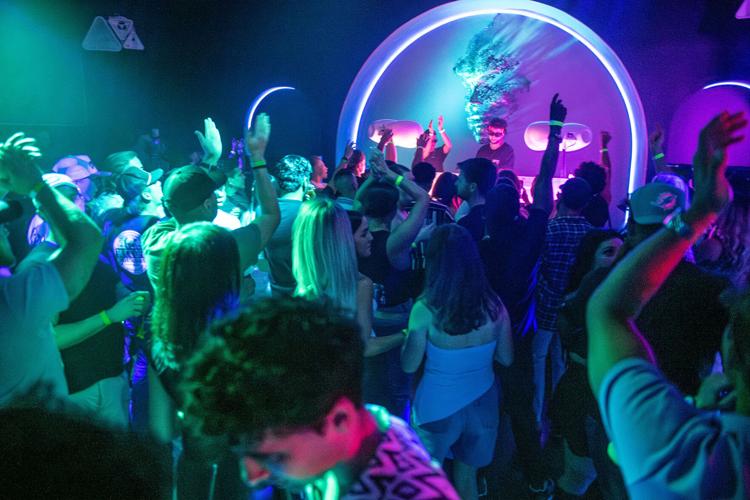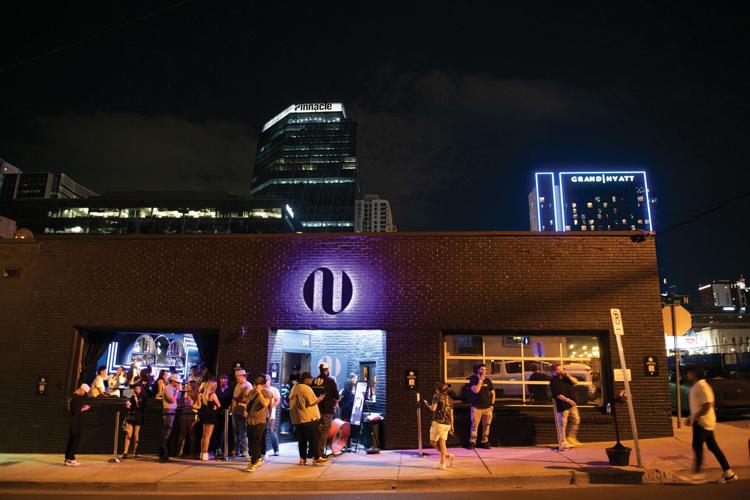
Night We Met
Nashville’s electronic-dance-music nightclub scene cooled off decades ago — but Music City’s rapid growth and diversification mean it may have a lot more room for club culture once again. The growth in popularity of house music and the influx of young adults make the perfect breeding ground for a comeback.
That was Austin Knight’s thinking when he opened his nightclub Night We Met earlier this year. Knight has worked with Full Circle Presents, the promoters behind popular dance-music-focused festival Deep Tropics, and he saw an opportunity to fill this gap in the nightlife scene.
“It just felt like the scene had grown enough to where it could actually sustain something like this,” Knight says. “Whereas like two or three years ago I would’ve been hesitant.”
To differentiate the establishment from a typical bar, Knight and Night We Metconcierge Brendan Hayes homed in on creating an elevated ambiance. They chose futuristic design elements, a high-grade sound system and quality cocktails.
What keeps regulars coming back and newcomers curious is the carefully curated group of DJs. Some are locals, while others come from around the country or abroad, and they cover a wide range of dance music — from techno to deep house, Afro house, Latin house and beyond. Several of the performers made their Music City debut at Night We Met.
“I would say in the U.S., house music is as big as it’s ever been,” Knight says.
EDM in general, house music in particular and the DJs and producers who bring this music to the dance floor have gradually increased in popularity over the past 10 years. Though long popular, dance music has surged more and more into the mainstream, especially with major pop artists joining forces with top-notch DJs.
A few highlights from 2024: Pop queen Charli XCX had a worldwide hit with her rave-scene-inspired dance album Brat, producer Calvin Harris and pop star Ellie Goulding followed up their Grammy-nominated 2023 collab “Miracle” with another hit called “(When I’m With You I’m) Free,” and rising star DJ John Summit sold out Madison Square Garden. Dance music has retaken center stage in pop culture, which may explain the yearning for a revival of communal club culture.
Slowly, the realm of genres in the Nashville music industry has expanded alongside the city itself. Hayes views this as an opportunity to amplify electronic and house music.
“Tapping into what the city is all about early and getting into that landscape to create an ecosystem that builds and elevates Music City to actually being Music City is, I think, probably the coolest part of what we do,” he says.

At Night We Met
If you weren’t around to experience the nightclub scene of the 1990s and early 2000s, you may find it hard to believe one existed at all, thanks to the way Nashville has leaned into the neon-canyon branding of Lower Broadway. But locals could club-hop between spots like Liquid Lounge and Graham Central Station on Second Avenue and massive LGBTQ nightclub The Connection. When the law required bartenders to turn on the lights at 2:30 a.m., after-hours clubs like Katatonic or Kiss acted as an oasis for revelers who felt like closing time was more of a suggestion.
The rise of smartphones and social media, plummeting alcohol consumption, stricter drug laws and even changes in music taste may be factors in dance clubs becoming a more peripheral presence in Nashville’s social scene than a central one over the past 20 years. The 2005 closure of The Connection was a huge nail in the coffin, and the pronounced chilling effect emphasizes the historic close connection between the queer community and nightclubs, in Nashville as in so many other places.
There are lots of key players in shaping Nashville’s nightlife today. Setting Lower Broad aside, many of them are pillars of the queer community like Play Dance Bar, the recently relocated and revamped Canvas, and The Lipstick Lounge, which is one of the few dedicated lesbian bars remaining in the U.S. Still, these places serve a different role than being a club where drinking cocktails and dancing to electronic music is the main focus. The Nashville Convention & Visitors Corp has a list of nightclubs that includes places like Skull’s Rainbow Room and Tequila Cowboy. But the majority of the places on the list promote themselves as bars, venues or even speakeasies.
While many millennials don’t seem to have a reverence for ’90s and Aughts club culture, much of Gen Z does — and that group is reaching drinking age. There’s a strong potential for this kind of environment to flourish again in Nashville. Whether it does or not, Knight and Hayes are committed to contributing something new to the market and making Night We Met all that it can be.
“We know what we are — that’s what we’re gonna be,” says Hayes. “If we build that consistency hopefully it just kinda continues elevating the scene all around the market, and makes Music City ‘Music City’ instead of something that’s just missing a little bit.”
Rounding up the city’s best after-hours eats and karaoke spots, talking to the night mayor and more







